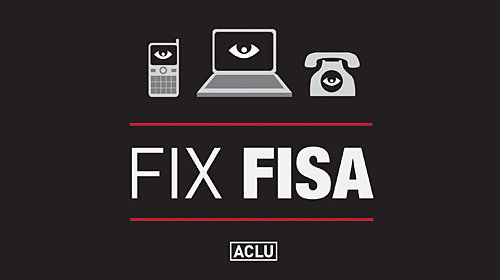
Today, we filed our brief with the Supreme Court in our lawsuit challenging the FISA Amendments Act, the 2008 law that ratified and expanded the National Security Agency’s warrantless wiretapping program. (You can read our brief here.)
The Foreign Intelligence Surveillance Act – FISA – is a post-Watergate statute that was meant to rein in and regulate domestic surveillance undertaken in the name of national security. In 2008, Congress amended the statute, giving the National Security Agency unprecedented power to conduct dragnet surveillance of Americans’ international communications. The ACLU immediately challenged the law, but the government has tried to keep our case out of court.
Our clients are a coalition of attorneys and human rights, labor, legal and media organizations whose work requires them to engage in sensitive and sometimes privileged telephone and e-mail communications with people located outside the U.S. The government argues they lack standing to challenge the law because they can't prove that their communications have been monitored under it. But, as we argue in our brief:
The government’s insistence that plaintiffs cannot establish standing without proving the certainty of surveillance is at bottom not a standing argument but a bid for a kind of immunity. This is because its proposed standard is one that neither plaintiffs nor anyone else will ever be able to meet—not because the surveillance they fear will never take place but because they will be unaware of it when it does...
The government theory of standing would render real injuries nonjusticiable and insulate the government’s surveillance activities from meaningful judicial review.
Last year a three-judge panel of the U.S. Court of Appeals for the Second Circuit rejected the government’s argument, and late last year the full Second Circuit refused the government's request to reconsider that ruling. But instead of allowing the case to be heard on the merits, the Obama administration asked the Supreme Court to review the case. Our brief urges the Court to affirm the appeals court’s decision. We write:
More than forty years ago, when surveillance technology was comparatively primitive, this Court recognized that “few threats to liberty exist which are greater than that posed by the use of eavesdropping devices” ... and it cautioned that the threat to core democratic rights was especially pronounced where surveillance authority was exercised in the service of national security.... To accept the government’s theory of standing would be to accept that the courts are powerless to address the threat presented by surveillance authorities exercised in secret, and powerless to protect Americans’ most fundamental rights against the encroachment of increasingly sophisticated and intrusive forms of government power.
Next week, a number of other organizations plan to file friend-of-the-court briefs in support of our lawsuit. Oral argument before the high court will be on October 29.
For more background on the battle over warrantless wiretapping, read this blog post. And, for more information on just how expansive the warrantless wiretapping spying program is, watch this video featuring NSA whistleblower William Binney.
Coincidentally, the 2008 amendments are scheduled to expire at the end of December, and we are calling on Congress to fix FISA by prohibiting dragnet surveillance, mandating more transparency about the government’s surveillance activities, and strengthening safeguards for privacy – join us in calling on your member of Congress to Fix FISA.
Learn more about warrantless wiretapping: Sign up for breaking news alerts,follow us on Twitter, and like us on Facebook.



